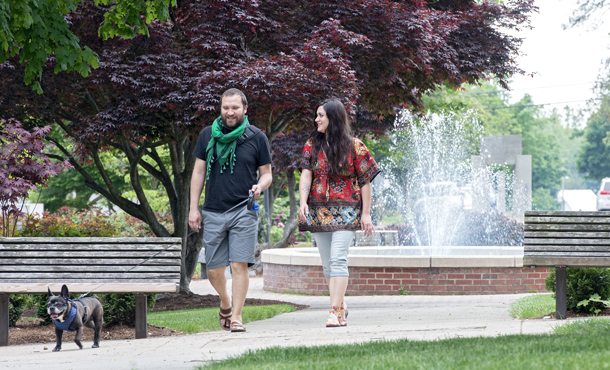Helping others find peace. That’s the shared goal of Cristian Quezada and Anita Fonseca-Quezada, Chilean immigrants who were drawn to Eastern Mennonite University because of its emphasis on conflict resolution.
Before coming to the U.S., the married couple called Santiago, Chile, home. The two were living on the 20th of a 21-floor apartment building when the capital city was hit by an 8.8-magnitude earthquake in 2010.
“It was awful,” Fonseca-Quezada said of the 2-minute, 30-second-long temblor. “I thought the world was coming to an end. And then when it stopped, you heard all these people yelling, ‘Help! Help!’ It took both of us 10 minutes to realize what happened.”
But the pair came away from the traumatic experience inspired.
Fonseca-Quezada said she has found healing through meditation and spiritual practices, and wants to share what she has learned with others.
The 32-year-old, whose father was a seminary professor and taught in eight nations across North, Central and South America, moved a lot when she was younger.
“Being ‘present’ is something I struggle with,” she said, explaining that, as a child, she struggled to feel like she fit in. “Through silent meditation, I have been able to feel like I am present where I am. If your mind is somewhere [else], you can’t really engage.”
Practicum offers hope
Fonseca-Quezada — currently pursuing a master’s degree in theology at EMU — and her husband, who in April earned a master’s in conflict transformation with emphasis in restorative justice and trauma healing, will facilitate women’s healing workshops starting this month.
The couple hopes to help Hispanic women who have come to the U.S. illegally to cope with traumas they’ve experienced, such as the pressures of a new country and ostracization from society, for example.
Quezada’s graduate school practicum, titled “Our History: Identity, Resilience and Hope,” focuses on helping women through art and dialogue.
Beginning this month, the workshops will be held Sundays at Emmanuel Episcopal Church in Harrisonburg, though a start date is yet to be fixed. Each will consist of six dialogues combined with art, for a session lasting about two hours, explained Quezada.
The art — based on mandalas characteristic of the Buddhist tradition — includes media such as painting, drawing, photography and poetry.
He explained that both the left and right sides of the brain are engaged while doing artwork and engaging in dialogue.
“You’re painting and drawing, and, in the process, reflect on your life, and when doing this, you can see things that you can’t see when you are [just] talking,” he said.
Quezada — who worked as a human rights attorney in Chile — volunteers with New Bridges Immigrant Resource Center, housed in the basement of Community Mennonite Church, 70 S. High St., Harrisonburg.
Many of the women with whom Quezada works struggle with identity and dignity, he said.
“It’s not about us giving them lectures; it’s about them talking. You have to create a safe space,” he said. “It’s therapeutic because they are speaking about their situation. We want to create the kind of circle they lost. … With dialogue, we can open doors for more in-depth conversations.”
Faith journey
It was through the Mennonite faith tradition that the couple became inspired to share with others.
“Before we got married, we weren’t going to church because it was lacking the peacebuilding aspect,” Anita said of their former faith traditions.
“We came … [to EMU] because of the peacebuilding emphasis.”
Before relocating to Harrisonburg in 2011, the couple began attending a Mennonite church in Indiana, where they had moved in 2010 while Fonseca-Quezada pursued a bachelor’s degree in journalism from Goshen College.
“It took us one Sunday to realize this was where we should be,” Fonseca-Quezada recalled.
The couple is also hoping to offer the workshop at any Spanish-speaking congregation in the central Valley.
Courtesy of the Daily News Record, June 7, 2014
